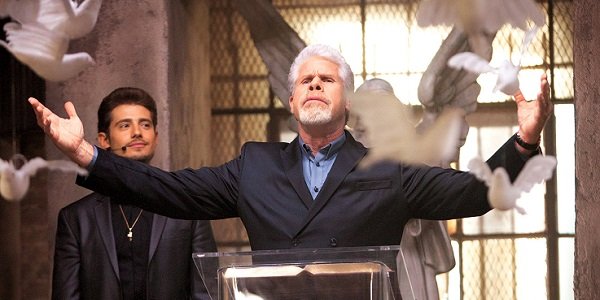The Big Problem Streaming Services Could Be Facing In The Future

Your Daily Blend of Entertainment News
You are now subscribed
Your newsletter sign-up was successful
For anyone who is into high-quality scripted television of all genres (except for horror, really), then there is much to cheer over in terms of how many original series have been hitting streaming sites in the past couple of years. And knowing these are still the early days is even more exhilarating, if not also mentally exhausting. But one man’s treasure is another man’s crippling future, and the exclusivity of the programming within the streaming world may one day lead to a downfall.
At least, that’s how it’s seen by veteran TV producer Ben Silverman, who has been one of the people behind such shows as The Office, The Biggest Loser and, most recently, Jane the Virgin and Netflix’s Marco Polo. Here’s what he says is the sign of the impending streaming implosion.
Most of the new streaming players are trying to control rights around the world, by buying out the talent’s upside participation early on. As streaming services launch more original shows, they’re basically killing the open market for their content by controlling it exclusively.
In theory, this practice is basically bad news for everyone. It limits the amount of money an actor can make on a project, as there’s probably often just an initial payout without a chance to making anything off of the backend, which helps to get lots of good people into a new show. Because there really isn’t a backend when Netlifx, Amazon and Hulu (among others) are the end of the line for the projects. Especially since the Blu-ray/DVD market isn’t soaring, and not all streaming shows get physical releases anyway.
That, in effect, isn’t good for streaming services in the long run, as they aren’t able to extend the revenue stream for original series in the same way that linear TV producers can. In the first place, there’s nowhere to get streaming income, as they’re already the ones shelling that out to get all of the licensed programming. There are also no current plans for syndication for something like Netflix’s Daredevil or Amazon’s Transparent, and while each show’s streaming home gives subscribers incentive to keep their monthly fees going, the shows aren’t able to find a second life than many syndicated shows get. Hell, networks like TNT and TBS get a lot of their viewers from syndicated offerings, and a nightly repeat of The Big Bang Theory will regularly blow other new cable shows out.
That lack of an extended financial return is not so bad for less-expensive shows like Hulu’s Difficult People or Netflix’s W/ Bob & David, but expansive dramas like Man in the High Castle and Marco Polo are extremely pricy. Not to mention the new Top Gear, which Amazon is dumping a ton of money into.
Netflix’s Ted Sarandos looks at every show’s economic impact apart from every other show, he told Fortune, and he also doesn’t have a demographic to worry about. Perhaps there will be a day when Netflix leases out some of its programming for supplemental income, which could help its $5 billion plan out by the time 2016 comes to a close.
Your Daily Blend of Entertainment News

Nick is a Cajun Country native and an Assistant Managing Editor with a focus on TV and features. His humble origin story with CinemaBlend began all the way back in the pre-streaming era, circa 2009, as a freelancing DVD reviewer and TV recapper. Nick leapfrogged over to the small screen to cover more and more television news and interviews, eventually taking over the section for the current era and covering topics like Yellowstone, The Walking Dead and horror. Born in Louisiana and currently living in Texas — Who Dat Nation over America’s Team all day, all night — Nick spent several years in the hospitality industry, and also worked as a 911 operator. If you ever happened to hear his music or read his comics/short stories, you have his sympathy.
